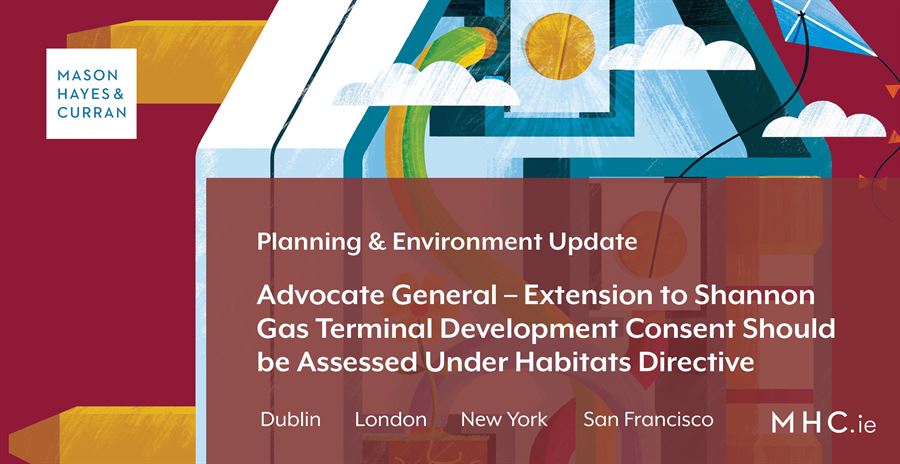
According to an Advocate General of the Court of Justice of the European Union (CJEU), an extension granted in 2018 to the development consent for the Shannon LNG gas terminal is subject to Article 6(3) of the Habitats Directive. Under that article, plans or projects not directly connected with or necessary to the management of a European site but likely to have a significant effect thereon, either individually or in combination with other plans or projects, shall be subject to appropriate assessment of its implications for the site in view of the site's conservation objectives.
Background
In March 2008, An Bord Pleanála granted a 10-year development consent for a liquefied natural gas (LNG) terminal at the Shannon Estuary, County Kerry. The project site is located close to two special areas of conservation. The developer subsequently applied for and was granted an extension to the construction phase for a further five years to 31 March 2023.
Friends of the Irish Environment (FIE) challenged the extension decision before the Irish High Court. The High Court then referred questions to the CJEU on compliance with the Habitats Directive.
Obligation to carry out a prior assessment
In her Opinion published on 30 April 2020,[1] Advocate General Kokott concludes that the extension decision triggers Article 6(3) of the Habitats Directive. She considers a number of factors in coming to that view:
-
The extension cannot be viewed as a single operation with an old project authorised for the first time before the Habitats Directive became applicable. This is because the original planning decision in 2008 was already subject to the Habitats Directive, although the Irish national regime in force at that time did not properly implement the directive. The Advocate General suggests that the developer had to have been aware of the requirements under the Habitats Directive, even if the 2008 decision otherwise complied with Irish law.
-
Under Irish law, any extension of the construction phase requires a new development consent, and the project cannot be constructed without that consent.
-
If the original assessment of the project did not contain “complete, precise and definitive findings and conclusions that were capable of removing all reasonable scientific doubt as to the effects of the proposed works”, then it is even more necessary to close any gaps when taking any extension decision.
-
Legal certainty and legitimate expectations based on the 2008 consent could only relate to the period of that development consent.
-
Unlike a recurring activity, which does not have any additional adverse effects, the extension decision concerns works to be carried out for the first time and should be assessed for any significant effect on the protection areas concerned.
Screening exercise
An assessment under Article 6(3) of the Habitats Directive must be carried out “where it cannot be ruled out, having regard to the best scientific knowledge in the field, that the plan or project might affect the conservation objectives for the site”. An earlier assessment of the same plan or project can rule out that risk only in so far as it contains complete, precise and definitive findings capable of removing all reasonable scientific doubt as to the effects of the works.
According to the Advocate General, the screening exercise to be carried out by the authorities should close any gaps in the earlier assessment of the project. It should also take account of whether:
-
The project has been changed in the meantime
-
Other plans and projects have been added which, together with the plan or project under assessment, could have a significant effect on the site
-
There have been any changes in the protected habitats and species concerned
-
Any new scientific knowledge is available
Implications
The Advocate General’s Opinion is not binding, although the CJEU in the majority of cases follows the Advocate General’s reasoning in its judgment. The judgment will be watched with interest by parties seeking extensions of expiring development consents, particularly where the original consent was granted at a time when the Habitats Directive was applicable, but the project may not have been assessed in compliance with it.
For more information on this development, contact a member of our Planning & Environment team.
The content of this article is provided for information purposes only and does not constitute legal or other advice.
[1] Opinion of Advocate General Kokott in Case C‑254/19 Friends of the Irish Environment Limited v An Bord Pleanála, Notice party: Shannon LNG Limited






